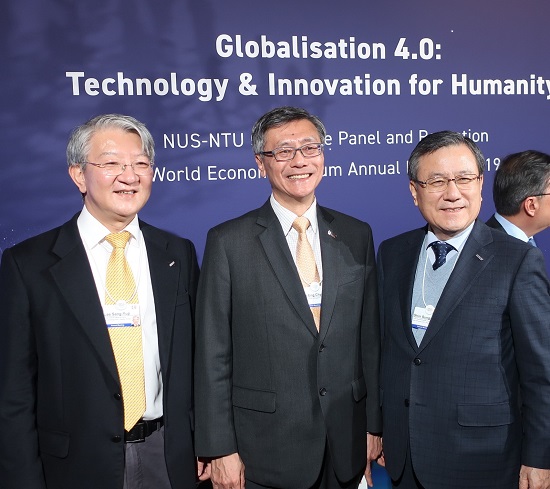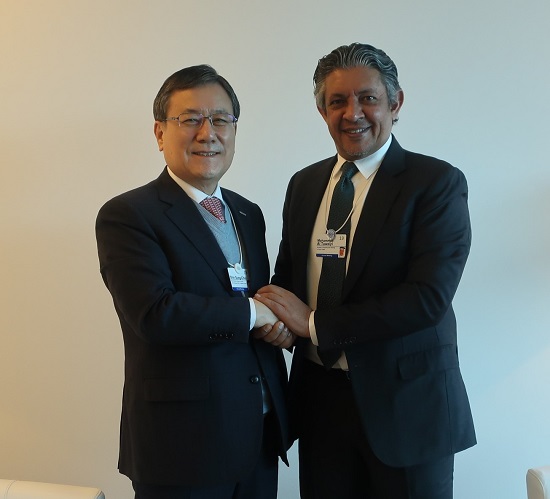people

(President Shin poses (far right) with the National University of Singapore President Tan Eng Chye (center) along with Distinguished Professor Sang Yup Lee in Davos last week.)
President Sung-Chul Shin shared his ideas on how reskilling is a critical element of growth, dynamism, and competitiveness for countries during a session titled “Closing the Skills Gap: Creating a Reskilling Revolution” at the World Economic Forum on January 24 in Davos.
While discussing a reskilling imperative alongside French Labor Minister Muriel Penicaud, he presented how the Korean government and KAIST are responding to the socio-economic transformation of workforces in the Fourth Industrial Revolution. After their presentation, Minister of Economy and Enterprise of Spain Nadia Calvirno Santamaria, Minister of Commerce and Industry of Oman Ali bin Masoud bin Ali Al Sunaidy, and Minister of Petroleum and Natural Gas, Skill Development, and Entrepreneurship of India Dharmendra Pradhan shared their views on the course of decision making regarding the proactive practices and policies they have applied for closing the gaps from their countries’ perspectives.
President Shin presented how to upskill and reskill SMEs and startups, the real players who will jumpstart the economy in the Fourth Industrial Revolution. He explained that the government is striving to change the existing structure of the economy, which is dominated by a few giant conglomerates. He added that the Korean government is trying to support SMEs and startups in terms of both funding and technology reskilling in order to rejuvenate the economy.
To better align itself with the government’s efforts, KAIST has introduced SME 4.0. SME 4.0 proposes to innovate the production process through the creation of a partnered platform between KAIST and SMEs across the country. With this platform, KAIST assists local SMEs for standardizing and systemizing all their processes of production, delivery, and management with enterprise resources planning (ERP) and manufacturing execution systems (MES). In addition, SME 4.0 offers retraining and re-tooling programs by linking the data generated through this platform in real time to better facilitate SMEs’ smart business.

(President Shin shakes hands with H.E.Mohammed Al-Tuwairi, Minister of Economy and Planning of Saudi Arabia before holding a bilaterla meeting in Davos.)
President Shin also explained about upskilling the leading corporations’ technological competitiveness, partnering with major leading corporations for upskilling their advanced technologies.
He also held a series of bilateral meetings with dignitaries attending the WEF annual meeting to discuss partnerships and collaborations. He also attended the Global University Leaders Forum (GULF), a community composed of 28 presidents from the world’s top universities on January 23. President Shin, who is on the advisory board of the Center for Fourth Industrial Revolution (C4IR), also participated in the board meeting and discussed the upcoming launching of the Korea C4IR, which will open at KAIST in March.
-
event KAIST holds its first ‘KAIST Tech Fair’ in New York, USA
< Photo 1. 2023 KAIST Tech Fair in New York > KAIST (President Kwang-Hyung Lee) announced on the 11th that it will hold the ‘2023 KAIST Tech Fair in New York’ at the Kimmel Center at New York University in Manhattan, USA, on the 22nd of this month. It is an event designed to be the starting point for KAIST to expand its startup ecosystem into the global stage, and it is to attract investments and secure global customers in New York by demonstrating the technological value
2023-09-11 -
event KAIST gearing up to train physician-scientists and BT Professionals joining hands with Boston-based organizations
KAIST (President Kwang Hyung Lee) announced on the 29th that it has signed MOUs with Massachusetts General Hospital, a founding member of the Mass General Brigham health care system and a world-class research-oriented hospital, and Moderna, a biotechnology company that developed a COVID-19 vaccine at the Langham Hotel in Boston, MA, USA on the morning of April 28th (local time). The signing ceremony was attended by officials from each institution joined by others headed by Minister LEE Young of
2023-04-29 -
event Metaverse Factory Center to Improve SME’s Competitiveness
The center is expected to enhance the manufacturing competitiveness of SMEs and root industry KAIST opened the ‘Metaverse Factory Experience Center for Manufacturing AI’ on November 1 at the KAIST Bigdata Center for Manufacturing AI. The AI-powered manufacturing metaverse factory will provide real-life experiences for the analysis and application of manufacturing data. Funded by the Ministry of SMEs and Startups, the center is a collaboration with Digiforet, which donated the soft
2021-11-03 -
event KAIST-WEF Roundtable on Inclusive Growth and Job Creation
The World Economic Forum (WEF) will join KAIST in an effort to address sweeping global problems in the wake of the Fourth Industrial Revolution. The two will co-host a roundtable on ‘Shaping Korea’s Priorities for Inclusive Growth and Job Creation in the Fourth Industrial Revolution’ on October 13 at Lotte Hotel in Seoul. The roundtable will bring together leaders from government, industry, universities, and non-profit civic organizations to have an in-depth discu
2017-09-28 -
policy KAIST Alumni Take a Strong Hold on Tech-Based Startups
Average sales for KAIST alumni startups in 2015 doubled from the previous year to 20.7 billion KRW. They reportedly recorded approximately 37-times higher sales than non-KAIST alumni startups, demonstrating that KAIST is emerging as strong tech-based venture startup incubator. According to a white paper on the Profile and Performance of KAIST Startups released recently, the number of KAIST startups stood 1,112, of which 877 were founded by alumni (78.9%), 36 by faculty and staff (3.2%), an
2017-05-30